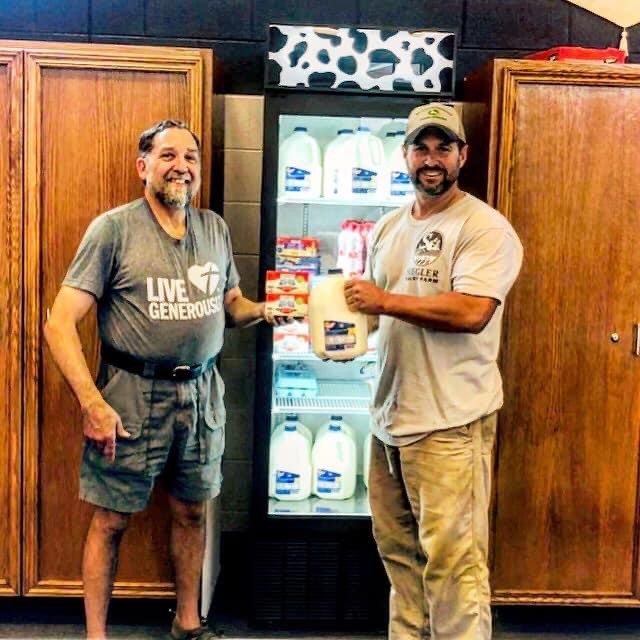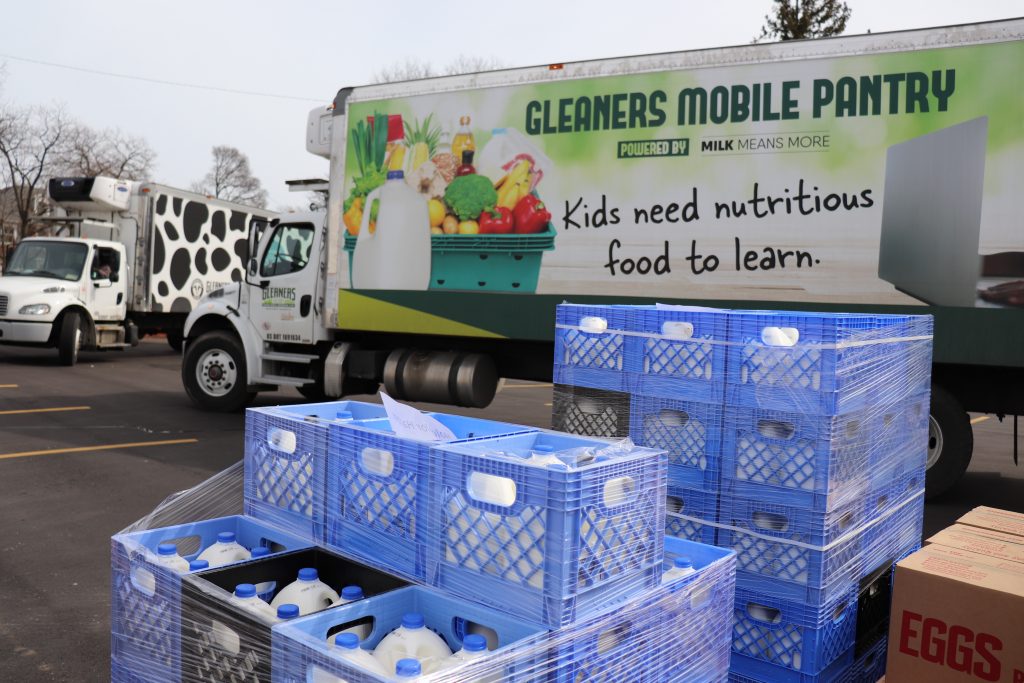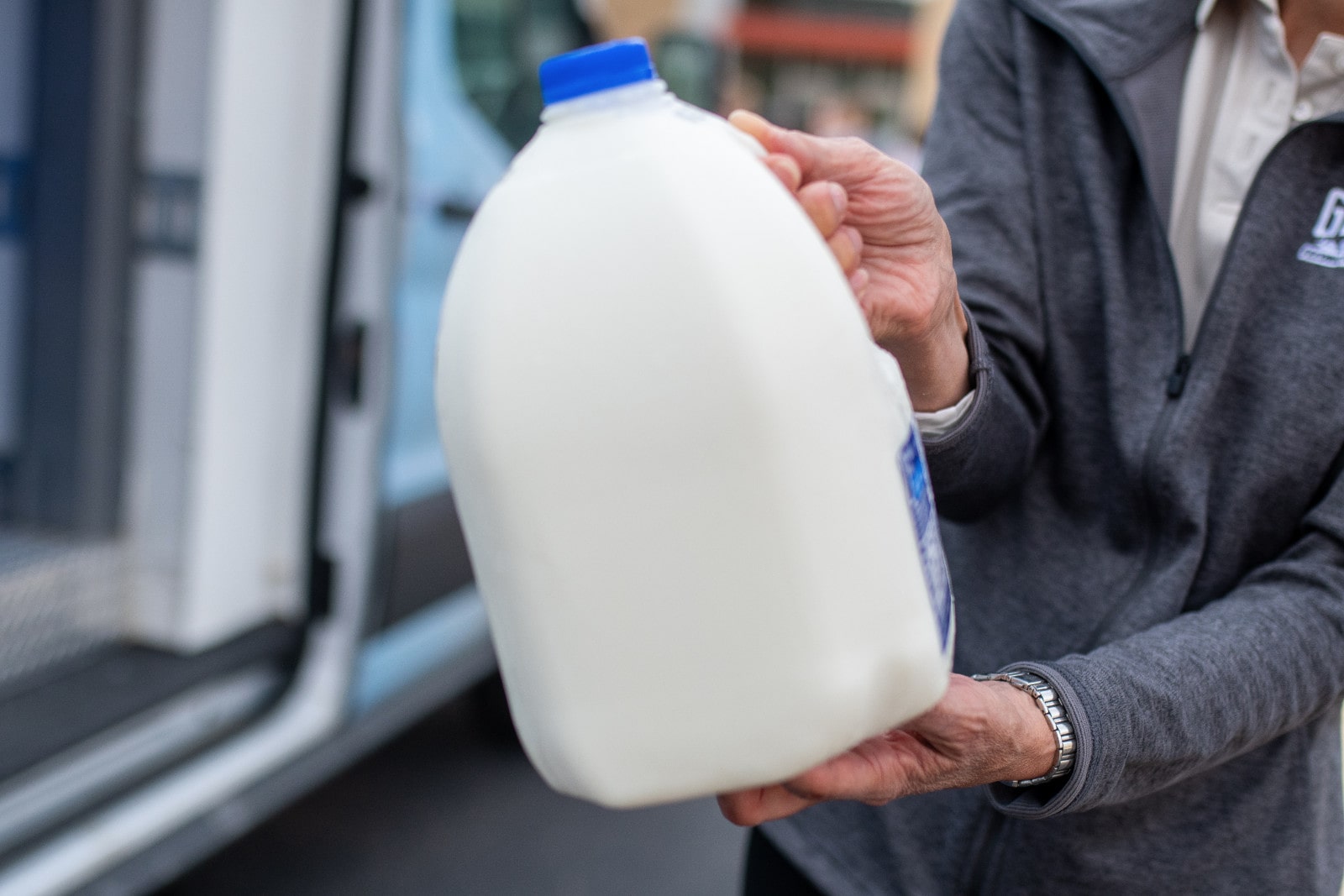The dairy community never thinks twice about helping a neighbor in need. At a local level, MMPA members regularly show up to support their community at fundraising dinners, charity events and pledge campaigns. While many of these events may have been cancelled or postponed during the COVID-19 pandemic, the number of people in need has continued to increase.
According to Feeding America, 42 million people may face hunger because of COVID-19, causing a 55 percent increase in the number of people seeking help from food banks. On behalf of dairy farmers, the United Dairy Industry of Michigan (UDIM) stepped in during the pandemic to help meet the need for food security in communities all across the state of Michigan.
“Food security is fluid and people use food banks for a variety of reasons,” Cortney Freeland, Director, Youth Wellness Programs at UDIM said. “Our goal is to keep milk as part of a necessary food for everyone, no matter their economic status.”
Keeping Milk Necessary to Everyone
In response to the increased need, UDIM expanded the programs that they had in place, along with developing new ones, to be reactive to the situation at hand. They supplemented the efforts of individual dairy farmers helping to ensure that no one goes hungry in Michigan.
“Our endeavors include raising awareness with consumers through retail milk drives and outreach initiatives, supporting our food bank partners building infrastructure to store and transport dairy and securing access to dairy in the food bank system,” Freeland said. “The support varies across our food bank partners based on their individual and unique needs for serving their client base.”
In a time of need, food banks were turning to UDIM for help servicing the growing number of people in need of nutritious foods like dairy. As members of the dairy community know, storing milk brings unique challenges with the limited shelf life and need for cold storage that were limiting food banks in the amount of dairy they could provide. In response to food banks’ needs and during a time of an oversupply of milk due to the closing of restaurants, UDIM stepped up and developed a cooler grant program, benefitting farmers and communities alike.

“Launched in response to requests from our dairy farmers’ communities about the increased need to provide food, including dairy, to their communities as COVID-19 shut down the economy, UDIM implemented two cooler grant programs in 2020,” Freeland said. “We were able to distribute 36 coolers as part of these cooler grant programs.”
The 36 coolers sit in food pantries throughout the state of Michigan and continue to service communities today. The impact is noticeable and the food pantries have been incredibly grateful.
“With the donation of this cooler, we can store more milk and pass it out to the families and individuals we serve,” a cooler grant recipient said. “Before receiving this donation, we did not have proper storage to keep milk and cheese on hand to pass out when a family requested it. We now have dairy on hand for anyone who asks for it.”
MMPA member Kip Siegler was one of many farmers who took advantage of the cooler grant program, helping strengthen his community’s food bank infrastructure for providing milk to his neighbors in need.
“Giving back to our community and people in need has always been important to us at Siegler Dairy Farm,” Siegler said. “We were able to get our local food bank a new milk cooler and they couldn’t have been more happy.”
Keeping Milk a Part of Students’ Nutrition
Along with the cooler grant program, UDIM paid careful attention to the pivot schools made from providing dairy during lunch time while in person in school, to strictly virtual schooling. They relied on relationships with school nutrition staff to ensure that dairy continued to be a crucial piece of students’ nutrition.
“When schools closed due to COVID-19, school nutrition staff made sure that students could still access the meals they needed,” Freeland said. “School meals are a nutrition lifeline to many children and families, easing the financial strain and uncertainty by providing a comforting source of consistency for students.”
UDIM recognized the school nutrition staff who worked tirelessly through the pandemic after being declared essential along with others in agriculture and the food industry. In recognition and celebration of the work that food service heroes do, UDIM launched the MI Food Heroes program, lifting up individuals crucial to ensuring that Michigan youth receive the nutrients they need, including those found in dairy.
“One in four children and one in six adults are experiencing food insecurity and those numbers only look more grim amid the current crisis,” Freeland said. “The need for food among our most vulnerable populations is not going away and the impacts of the pandemic will last for years to come.”
In 2021, as we continue to battle the effects of COVID-19 nearly a year and a half later, an estimated 42 million people, including 13 million children are at risk of hunger, according to Feeding America. UDIM continues to support the dairy community’s spirit of giving alongside farmers, schools, cooperatives, processors, food banks and others to support our neighbors impacted by hunger.

MMPA and FBCM Hunger Initiatives:
While UDIM was helping secure milk and dairy for food banks while strengthening their infrastructure, the Food Bank Council of Michigan (FBCM) was overwhelmed by the growing number of people who were going hungry due to COVID-19 related hardships.
“Over the last year, Michigan’s food banks distributed over 40 percent more food than a typical year to help meet the needs of our communities,” Phil Knight, Executive Director at FBCM said. “We have worked with many organizations to supplement the food our partner food banks have distributed. MMPA continues to play a key role in ensuring the people in our communities have access to fresh milk.”
Milk remains one of the most requested items at food pantries. In 2020, FBCM’s seven member food banks distributed over 730,000 gallons of fresh milk and one million pounds of cheese. Many of these distributions were made possible by the work of legislators developing programs and securing funding to allow even more dairy products to end up in the fridges of those who needed it most.
“The USDA Farmers to Families Food Boxes was introduced a year ago and Michigan’s food bank network distributed over 50 million pounds of food through this USDA program,” Knight said. “The CARES Act allowed us to purchase $19 million worth of food, of which $3 million was dedicated to purchasing Michigan dairy.”
Some of the funding that FBCM received was used to purchase more than 80,000 pounds of Heritage Ridge Creamery cheese to distribute to food insecure families. In conjunction with Kroger’s Michigan Dairy plant, MMPA also donated over 85,000 gallons of milk to the FBCM and donated butter and Heritage Ridge Creamery cheese to local food banks in Michigan and Indiana.
This article was originally published in the May/June 2021 issue of the Milk Messenger. Subscribe »

